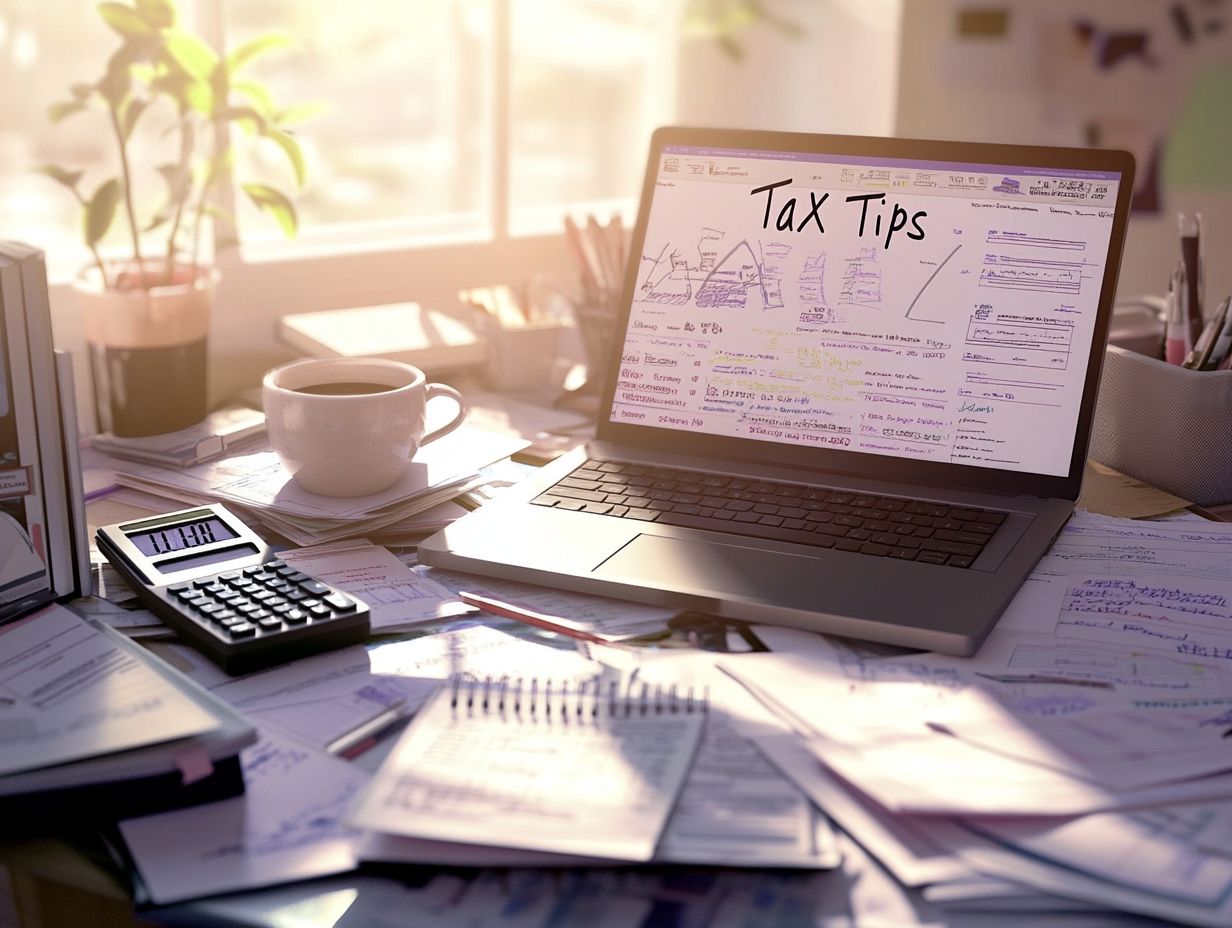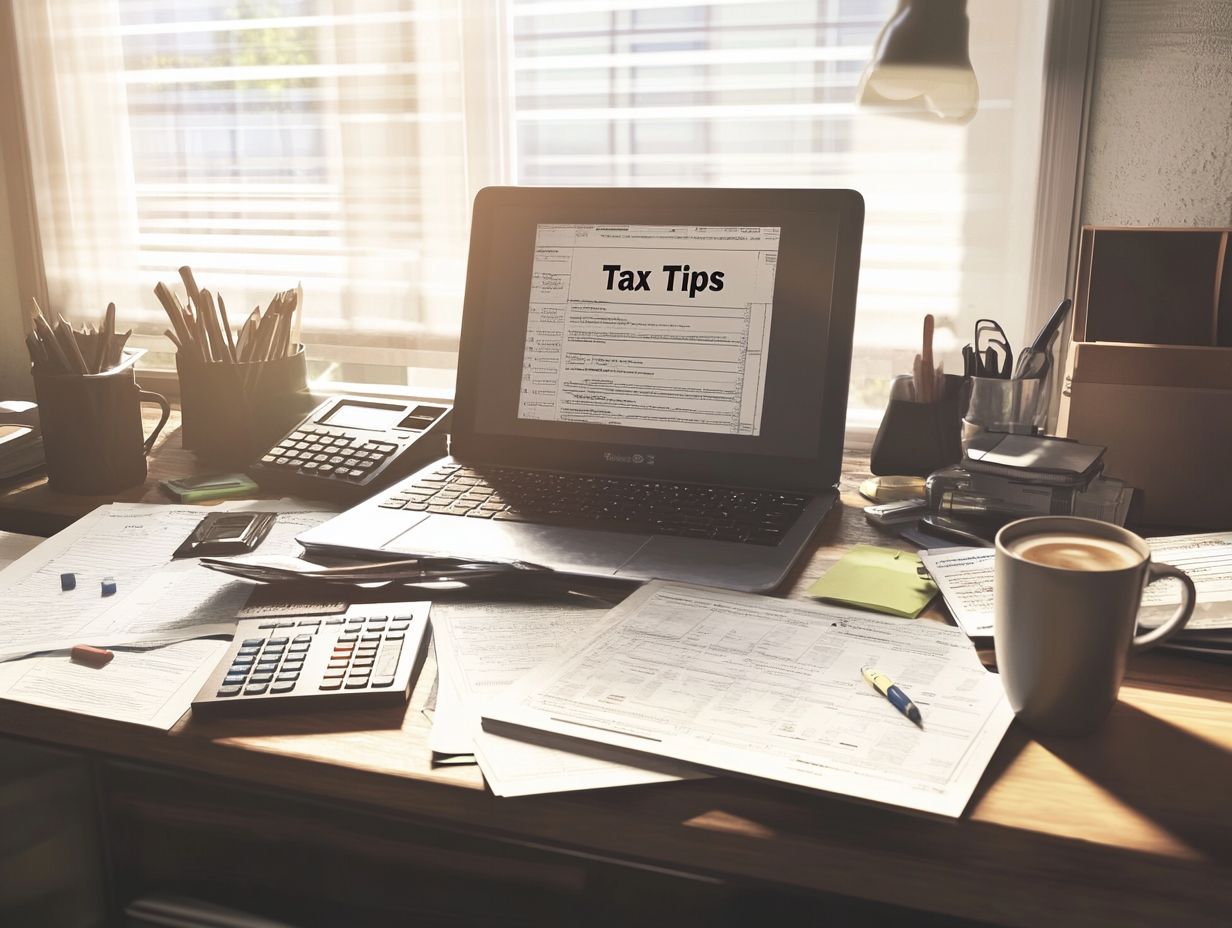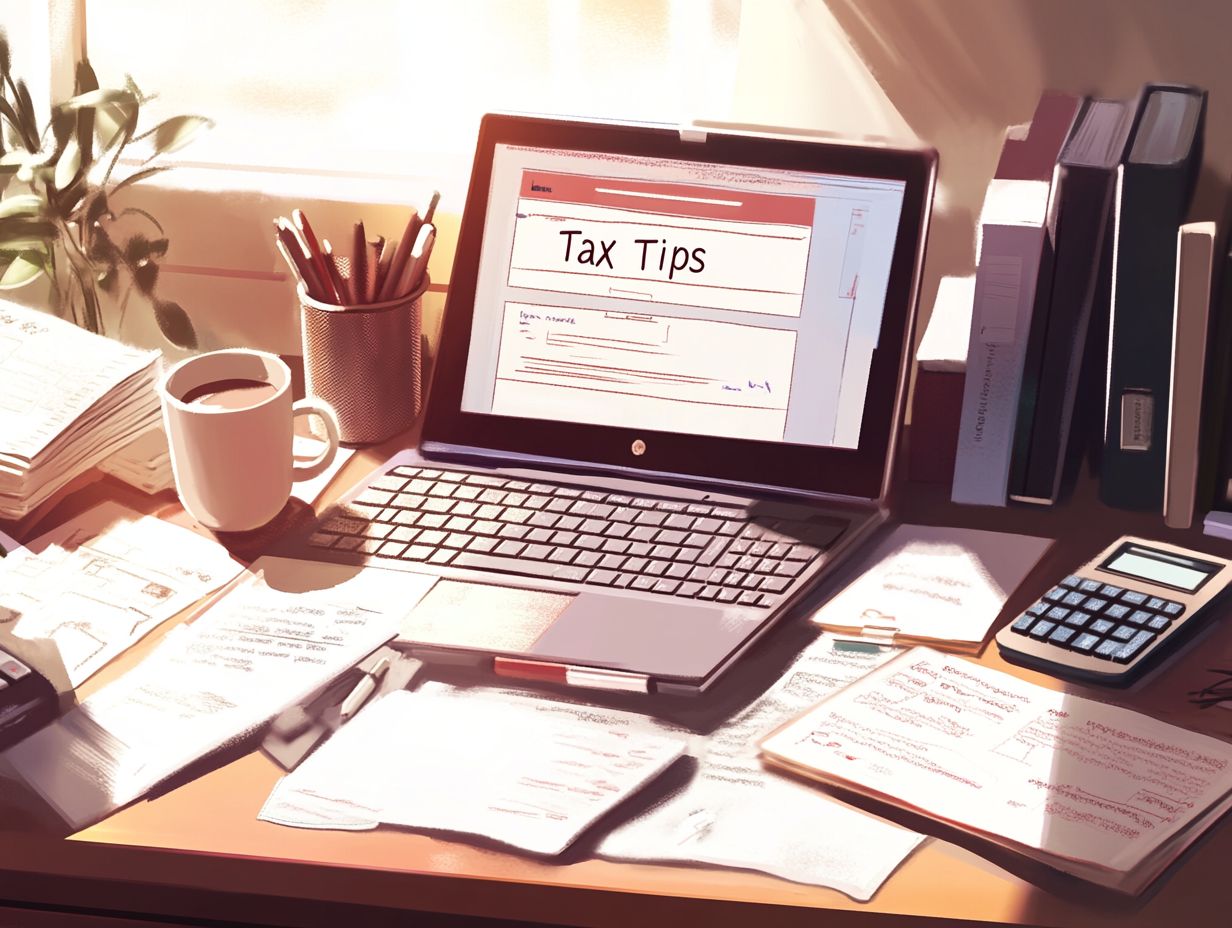5 Essential Tax Filing Tips for Freelancers
Navigating taxes as a freelancer may seem daunting, yet it doesn t have to be. With diverse income streams and an array of deductions at your disposal, grasping your tax obligations is vital for achieving financial success.
Here are five essential tips to empower you in filing your taxes with confidence and efficiency.
- Maintain precise records.
- Recognize when it s wise to hire a professional.
- Understand your deductions.
- Stay informed about tax law changes.
- Plan ahead for tax payments.
You ll discover everything you need to simplify tax season and make it a breeze.
Contents
- Key Takeaways:
- 1. Keep Accurate Records of Income and Expenses
- 2. Understand Your Tax Obligations as a Freelancer
- 3. Take Advantage of Deductions and Credits
- 4. Consider Hiring a Professional Tax Preparer
- 5. File Your Taxes on Time and Keep Track of Deadlines
- What Are the Common Tax Deductions and Credits for Freelancers?
- How Can a Freelancer Keep Accurate Records of Income and Expenses?
- What Are the Tax Obligations for Freelancers in Different Countries?
- How Can a Freelancer Determine If They Need to Hire a Tax Preparer?
- What Are the Penalties for Filing Taxes Late as a Freelancer?
- What Are the Top Mistakes Freelancers Make When Filing Taxes?
- Frequently Asked Questions
Key Takeaways:

- Keep detailed records of income and expenses to accurately report earnings and reduce tax liability.
- Understand the unique tax obligations that come with being a freelancer, such as taxes you pay as a freelancer and estimated tax payments.
- Take advantage of deductions and credits available to freelancers, such as home office expenses and health insurance premiums.
1. Keep Accurate Records of Income and Expenses
For freelancers, keeping precise records of income and expenses is essential for effective financial planning and tax compliance. Not only does this practice provide you with the necessary documentation for possible IRS checks, but it also empowers you to minimize your tax liability by maximizing eligible deductions and credits, including business expenses and home office deductions.
Tracking vital documents such as 1099 forms and receipts for business-related purchases can profoundly impact your overall financial health. Maintaining records of freelance income is equally important.
Leveraging tools like accounting software or apps tailored for freelancers can simplify this process, making financial management a breeze. Many of these tools offer features for invoicing and expense tracking, helping you stay organized throughout the year.
Start keeping your records organized now to reduce stress on tax day! By adopting a systematic approach to record-keeping, you can gain valuable insights into your financial performance and make informed decisions, ultimately leading to increased profitability.
2. Understand Your Tax Obligations as a Freelancer
Understanding your tax obligations as a freelancer is essential for effectively managing your financial liability. You’ll need to navigate taxes you pay as a freelancer, report your income on Schedule C, and accurately calculate your estimated tax payments throughout the year to avoid penalties and ensure compliance with IRS regulations.
It’s essential to recognize that your tax obligations can vary significantly based on your income level and the state in which you operate. A higher income might lead to increased taxes, while certain states could impose additional taxes or requirements that you must be mindful of.
Filing Schedule C correctly is crucial. This form allows you to detail your earnings and deductions, aiding in precise tax calculations. Making estimated tax payments quarterly isn’t merely a suggestion; it s a strategy to prevent a hefty tax bill at year s end and to reduce the risk of facing an IRS audit, which can be both daunting and costly.
3. Take Advantage of Deductions and Credits
Freelancers like you can significantly reduce your taxable income by leveraging a variety of tax deductions and credits. These range from essential business expenses and the ever-important home office deduction to valuable tax credits such as the child tax credit and contributions to retirement accounts like traditional IRAs and solo 401(k)s.
But that s just the beginning. You can also explore deductions for healthcare premiums, professional development costs, and even specific vehicle expenses related to your work. For example, if you run a design business, expenses for software tools and supplies are fully deductible, which allows you to manage costs more effectively.
Traveling for conferences or client meetings? You can benefit from travel deductions as well. To truly maximize these savings, it s vital for you to maintain detailed records of your expenses.
Partnering with a tax professional can be a game-changer. They can customize strategies tailored to your unique financial situation, ensuring you don t overlook any potential credits or deductions that apply to your line of work.
Embracing these strategies will help you tackle your taxes like a pro! Let s make tax season a breeze together!
4. Consider Hiring a Professional Tax Preparer

Hiring a professional tax preparer can be a savvy investment for freelancers who want to optimize their tax strategy. Tax professionals offer valuable insights into understanding tax rules, ensuring compliance during IRS audits, and maximizing deductions that you might overlook when filing on your own.
Their extensive knowledge of the latest tax laws enables them to spot credits and deductions that individuals often miss, ultimately saving you money. For those navigating multiple income streams or unique financial situations, professional assistance can streamline your financial record organization, making it easier to track income and expenses throughout the year.
Personalized financial planning advice from an expert can lead to better long-term strategies such as retirement planning and investment insights. This support is crucial for freelancers facing audits or complicated tax scenarios. Having an expert in your corner can lighten the load and ensure your filings are accurate.
5. File Your Taxes on Time and Keep Track of Deadlines
Filing your taxes on time is essential for freelancers. It helps you avoid penalties from the IRS, maintain clear financial standing, and ensure that your estimated tax payments are handled correctly. Missing deadlines can lead to increased tax liability and complicate your financial planning efforts.
Understanding these tax deadlines is crucial, especially since freelancers typically must make quarterly estimated tax payments throughout the year. Those quarterly deadlines usually fall in April, June, September, and January of the following year, while the final filing deadline is generally set for April 15.
If you overlook these deadlines, you risk penalties and accruing interest charges on unpaid taxes, further complicating your financial situation. To steer clear of these pitfalls, consider implementing strategies like keeping organized records, scheduling reminders, and consulting a tax professional. These steps can bolster your confidence in meeting deadlines effectively.
What Are the Common Tax Deductions and Credits for Freelancers?
Freelancers often miss out on several lucrative tax deductions and credits that translate into substantial savings. Key opportunities include:
- Home office deduction
- Various business-related expenses
- Valuable tax credits like the child tax credit and earned income tax credit
These financial incentives not only alleviate your overall tax burden but also enhance your net income. For example, the home office deduction allows you to deduct a portion of your rent or mortgage interest, utilities, and even internet expenses if you maintain a dedicated workspace at home.
You can also deduct costs associated with supplies purchased for business purposes. For instance, if you have a monthly home office expense of $1,000, you could potentially deduct hundreds of dollars from your taxable income, significantly lowering your tax liability.
Programs like the earned income tax credit offer essential relief for lower-income freelancers. Staying informed about these opportunities is crucial, as they can lead to noteworthy financial advantages, including avoiding common pitfalls. For more insights, check out the top tax mistakes freelancers make.
How Can a Freelancer Keep Accurate Records of Income and Expenses?
To maintain accurate records of your income and expenses, it s essential to adopt a systematic approach. Track every form of income, categorize your business expenses, and keep a tidy archive of the 1099 forms you receive from clients.
Using accounting software or spreadsheets can simplify this process, making it easier to monitor cash flow and generate reports. Regularly updating your financial records ensures that nothing falls through the cracks, while categorizing expenses helps identify potential tax deductions.
It s also vital to keep all your receipts organized whether digitally or physically as proof of your expenditures when tax season rolls around. By establishing a routine for financial maintenance, you position yourself for greater clarity and control over your finances, allowing you to focus more on your creative pursuits.
Don’t miss these valuable tips! Start organizing your records today!
What Are the Tax Obligations for Freelancers in Different Countries?

As a freelancer, it s essential to recognize that tax obligations can vary dramatically from one country to another. Each country has different rules about self-employment taxes, estimated tax payments, and the documentation required for income reported to the IRS and other authorities.
Understanding these nuances is vital for maintaining compliance and avoiding penalties. For instance, while some countries mandate quarterly tax payments, others operate on an annual cycle. This can make managing your cash flow more difficult if you’re working internationally.
The documentation you need can also range widely, from straightforward income statements to intricate accounts of expenses and receipts. Leveraging resources such as international tax guides, online forums, and consultations with tax professionals specializing in cross-border taxation can significantly help you navigate these complexities.
By staying informed, you can effectively manage your tax obligations and keep your focus on what you do best your creative work.
How Can a Freelancer Determine If They Need to Hire a Tax Preparer?
Navigating taxes can be tricky; here s how to decide if you need help. Determining whether you should hire a tax preparer requires a careful evaluation of the complexity of your financial situation, your familiarity with tax laws, and the potential risk of an IRS audit each of which could significantly influence your overall financial planning.
If your income as a freelancer fluctuates dramatically throughout the year or surpasses a certain threshold, it may be time to consider professional assistance. Freelancers managing diverse income streams, such as contracting, consulting, or product sales, often find the task of reporting these earnings quite daunting. If past audits have overwhelmed you, hiring a tax professional might be the best choice.
To navigate these considerations effectively, you might find it helpful to use a checklist that includes:
- Assessing your income levels
- Evaluating the number and types of deductions available to you
- Reflecting on your comfort level with tax regulations
By taking these factors into account, you can make a more informed decision about whether to engage a tax expert.
What Are the Penalties for Filing Taxes Late as a Freelancer?
Submitting your taxes on time is crucial for your financial health! Filing your taxes late as a freelancer can lead to significant penalties from the IRS, including financial charges that can inflate your overall tax liability and complicate your future financial planning.
The repercussions extend beyond mere fines; the IRS may also impose interest on overdue amounts, which can compound your total debt over time. Missing deadlines can set off a domino effect that jeopardizes your financial health.
Act now to avoid these pitfalls by creating a clear tax timeline, setting reminders, and leveraging organizational tools to streamline your record-keeping. When life’s unpredictability makes deadlines feel insurmountable, remember you have the option to file for extensions. This provides a temporary reprieve and allows for a more accurate reporting of your income and expenses.
Stay proactive about your taxes and consult with a professional today!
What Are the Top Mistakes Freelancers Make When Filing Taxes?
Don t let tax mistakes catch you off guard! Freelancers often trip over various tax-related missteps. Common pitfalls include not tracking business expenses properly and neglecting to report all freelance income. These oversights can heighten the risk of IRS audits and cause missed tax deductions.
Another common blunder is misclassifying personal expenses as business-related. This can result in hefty penalties and a re-evaluation of your tax return by the IRS. Many freelancers also fall short in setting aside adequate funds for self-employment taxes, which are the taxes freelancers must pay on their earnings. To avoid these pitfalls, consider maximizing deductions to avoid an unwelcome financial surprise come tax day.
It’s all too easy to overlook valuable tax credits and deductions specifically tailored for self-employed individuals. These credits could significantly reduce your taxable income.
To steer clear of these pitfalls, maintain meticulous records, utilize accounting software, consult with a tax professional, and stay updated on tax law changes. These steps can profoundly impact your compliance and maximize your potential savings.
Frequently Asked Questions

What are the top 5 essential tax filing tips for freelancers?
1. Keep track of all your income and expenses: To accurately file your taxes, you need a record of all the money you’ve earned and spent during the year as a freelancer.
2. Understand your deductions: Freelancers are entitled to various deductions such as home office expenses, equipment purchases, and travel expenses. Make sure you understand which deductions you’re eligible for to maximize your tax savings.
3. Pay estimated taxes: Unlike traditional employees who have taxes withheld from their paychecks, freelancers are responsible for paying estimated taxes throughout the year. Failing to do so can result in penalties and interest.
4. Keep organized and accurate records: Staying organized and keeping accurate records is key to a smooth tax filing process. This not only helps with completing your tax return but also comes in handy if you face an audit.
5. Consult a tax professional: Freelance taxes can be complicated and overwhelming. Seeking help from a tax professional who specializes in freelancers can ensure your taxes are filed correctly, and you re taking advantage of all available deductions.
Do I need to file taxes as a freelancer?
Yes, as a freelancer, you are considered self-employed and must file taxes if you earn more than $400 in a year. It’s also crucial to report all your income, even if you did not receive a 1099 form from a client.
What happens if I don’t file my taxes as a freelancer?
If you fail to file your taxes as a freelancer, you may face penalties and interest on the taxes owed. The IRS may also start collection actions, such as wage garnishment or placing a lien on your assets.
Can I deduct my home office as a freelancer?
Yes, you can deduct a portion of your rent or mortgage, utilities, and other home-related expenses if you use a portion of your home exclusively for your freelance business. Specific guidelines and requirements exist for claiming a home office deduction, so it’s important to consult a tax professional.
What expenses can I deduct as a freelancer?
Some common deductible expenses for freelancers include home office expenses, equipment and supply purchases, professional and trade association dues, marketing and advertising costs, and travel expenses. It’s essential to keep accurate records and consult a tax professional to determine which expenses are deductible for your specific business.
When is the deadline for filing taxes as a freelancer?
The deadline for filing taxes as a freelancer is typically April 15th, but it can vary depending on the year and your circumstances. If you are unable to file by the deadline, you can request an extension until October 15th. However, any taxes owed must still be paid by the original deadline to avoid penalties and interest.
Take action today! Consult a tax professional or download a tax checklist to ensure you’re fully prepared.






